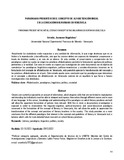Mostrar el registro sencillo del ítem
Paradigmas presentes en el concepto de alfabetización inicial en la educación bolivariana en Venezuela
| dc.rights.license | http://creativecommons.org/licenses/by-nc-sa/3.0/ve/ | es_VE |
| dc.contributor.author | Arévalo, Joamsner Magdalena | |
| dc.date.accessioned | 2023-01-31T14:43:21Z | |
| dc.date.available | 2023-01-31T14:43:21Z | |
| dc.date.issued | 2023-01-31 | |
| dc.identifier.issn | 1690-3226 | |
| dc.identifier.uri | http://www.saber.ula.ve/handle/123456789/48865 | |
| dc.description.abstract | Actualmente los ciudadanos están expuestos a una cantidad de información, lo que exige destrezas que no se limiten a la reproducción y decodificación, sino que los mismos deben ser capaces de interpretar y expresarse a través de distintos medios y en más de un idioma. En este sentido, el conocimiento y comprensión de los paradigmas sobre los cuales se erigen las prácticas alfabetizadoras permitirá la formulación oportuna de políticas pertinentes a la realidad. Con esto en mente se expone una investigación de corte documental con el objetivo de caracterizar los paradigmas lingüísticos-cognitivos, políticos-económicos y sociales-discursivos inmersos en la formulación del concepto de alfabetización en Venezuela, esto permitirá apreciar la transformación del concepto y las prácticas alfabetizadoras en el país. Este estudio aporta como conclusión que los paradigmas que interactúan en el concepto y directrices de alfabetización en Venezuela carecen de un equilibrio lo que llama a futuras investigaciones más detalladas. | es_VE |
| dc.language.iso | es | es_VE |
| dc.publisher | SaberULA | es_VE |
| dc.rights | info:eu-repo/semantics/openAccess | es_VE |
| dc.subject | Alfabetización | es_VE |
| dc.subject | Paradigmas | es_VE |
| dc.subject | Lingüística | es_VE |
| dc.subject | Política | es_VE |
| dc.subject | Sociedad | es_VE |
| dc.title | Paradigmas presentes en el concepto de alfabetización inicial en la educación bolivariana en Venezuela | es_VE |
| dc.title.alternative | Paradigms present in the initial literacy concept in the bolivarian education in Venezuela | es_VE |
| dc.type | info:eu-repo/semantics/article | es_VE |
| dcterms.dateAccepted | 09/12/2022 | |
| dcterms.dateSubmitted | 03-10-2022 | |
| dc.description.abstract1 | Citizens are currently exposed to an amount of information, which requires skills that are not limited to reproduction and decoding but individuals must be able to interpret and express themselves through different means and in more of one language. In this sense, knowledge and understanding of the paradigms on which literacy practices are built will allow the opportune formulation of policies truly relevant. With this in mind, a documentary investigation is exposed in order to characterize the linguistic-cognitive, political-economic and social-discursive paradigms immersed in the formulation of the concept of literacy in Venezuela, this will allow the public to appreciate the transformation of the concept and practices of literacy teachers in the country. This study provides as a main conclusion that the different paradigms that interact in the concept and guidelines of literacy in Venezuela lack a balance which calls for more detailed future research on school literacy practices. | es_VE |
| dc.description.colacion | 93-105 | es_VE |
| dc.description.email | smartkelly1912@gmail.com | es_VE |
| dc.description.frecuencia | Semestral | |
| dc.description.paginaweb | http://www.saber.ula.ve/academia/ | |
| dc.identifier.depositolegal | pp 200202 TRI 298 | |
| dc.identifier.eissn | 2244 - 842X | |
| dc.publisher.pais | Venezuela | es_VE |
| dc.subject.institucion | Universidad de Los Andes | es_VE |
| dc.subject.keywords | Literacy | es_VE |
| dc.subject.keywords | Paradigms | es_VE |
| dc.subject.keywords | Linguistics | es_VE |
| dc.subject.keywords | Politics | es_VE |
| dc.subject.keywords | Society | es_VE |
| dc.subject.seccion | Academia: Revisión | es_VE |
| dc.subject.tipo | Artículos | es_VE |
| dc.type.media | Texto | es_VE |
Ficheros en el ítem
Este ítem aparece en la(s) siguiente(s) colección(ones)
-
Academia - Nº 45 Especial
2021-2022


